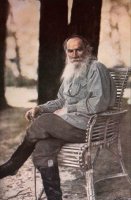Nonno
Habari Na Mijeldi
Interesting article on Tolstoy
"No bookshelf is complete without those massive Russian tomes, War and Peace and Anna Karenina. Many say Leo Tolstoy authored the greatest novels ever written. The size of these sweeping epics was rivaled only by the writer's formidable beard. Each novel pondered those questions that plague man most -- the meaning of life, the struggle with lust, political freedom, union with God, death. His books were highly moral, yet they were often censored by the Russian government, for the mere mention of adultery and suicide and war that kept those pages turning.
Tolstoy became a spiritual master in his later life, to ardent followers who believed he was closer to God than the rest of us mortals. He had spent his life writing essays and fictions showing his philosophies of pacifism, equality, anarchy, compassion, animal rights, and chastity. He also extolled the virtues of labor and condemned the elite for "pharisaic" leisure they passed off as work. Though he was born into nobility and heir to vast fortune, he gave away large sums of money to beggars, sometimes abandoning his possessions and even the copyrights to his own work. A devout Christian, his ideas about peace influenced Ghandi and Martin Luther King Jr.
Yet Tolstoy's detractors point out that the man who preached humility toward every being, human or animal, was mightily arrogant. The writer dismissed Shakespeare as repulsive and tedious, and called critical and popular acclaim for the bard "evil." He was obsessed with moralizing, and his fixation on chastity, even for married couples, was just plain bizarre, a fetish in its own right. His eternal compassion did not seem to extend to women -- prostitutes and wives both were "whores" seducing men and the fruits of their labor with baubles and curves. Worse, some sought "women's rights," and to avoid bearing children. "You will not say after two children, or after twenty, that you have done enough," he wrote in To Women.
More at: Bookslut | Falling Short of the Glory of God
"No bookshelf is complete without those massive Russian tomes, War and Peace and Anna Karenina. Many say Leo Tolstoy authored the greatest novels ever written. The size of these sweeping epics was rivaled only by the writer's formidable beard. Each novel pondered those questions that plague man most -- the meaning of life, the struggle with lust, political freedom, union with God, death. His books were highly moral, yet they were often censored by the Russian government, for the mere mention of adultery and suicide and war that kept those pages turning.
Tolstoy became a spiritual master in his later life, to ardent followers who believed he was closer to God than the rest of us mortals. He had spent his life writing essays and fictions showing his philosophies of pacifism, equality, anarchy, compassion, animal rights, and chastity. He also extolled the virtues of labor and condemned the elite for "pharisaic" leisure they passed off as work. Though he was born into nobility and heir to vast fortune, he gave away large sums of money to beggars, sometimes abandoning his possessions and even the copyrights to his own work. A devout Christian, his ideas about peace influenced Ghandi and Martin Luther King Jr.
Yet Tolstoy's detractors point out that the man who preached humility toward every being, human or animal, was mightily arrogant. The writer dismissed Shakespeare as repulsive and tedious, and called critical and popular acclaim for the bard "evil." He was obsessed with moralizing, and his fixation on chastity, even for married couples, was just plain bizarre, a fetish in its own right. His eternal compassion did not seem to extend to women -- prostitutes and wives both were "whores" seducing men and the fruits of their labor with baubles and curves. Worse, some sought "women's rights," and to avoid bearing children. "You will not say after two children, or after twenty, that you have done enough," he wrote in To Women.
More at: Bookslut | Falling Short of the Glory of God
Attachments
Last edited:

